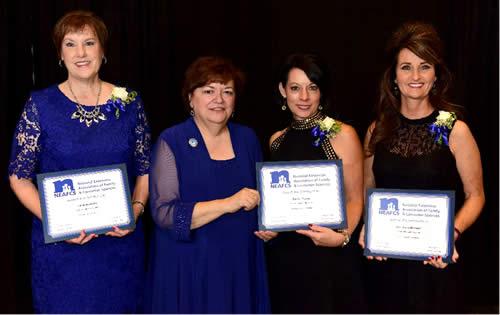County Extension Agent
 March 1, 2022 - It’s a new year and time for a new you! Become the biggest loser in Shelby County — of weight, that is. Prizes will be awarded to the most successful competitors in the county’s weight loss and physical fitness program. Texas A&M AgriLife Extension Service in Partnership with Panola College is offering Step Up & Scale Down, a 12-week weight management program to help the public in their efforts. Join Texas A&M AgriLife Extension and Panola College for this program.
March 1, 2022 - It’s a new year and time for a new you! Become the biggest loser in Shelby County — of weight, that is. Prizes will be awarded to the most successful competitors in the county’s weight loss and physical fitness program. Texas A&M AgriLife Extension Service in Partnership with Panola College is offering Step Up & Scale Down, a 12-week weight management program to help the public in their efforts. Join Texas A&M AgriLife Extension and Panola College for this program.
Registration is going on now at the Shelby College Center, Loop 500, Center, TX 75935, (936) 598-9543. Please register today and submit your $40 participation fee. Participants will weigh-in on the first day of class which is March 1, 2022, at Panola College, Loop 500, Center, TX 75935 in Room 106. Class is on Tuesdays from 5:30pm to 6:30pm.
Winners of the 12-week challenge will be determined by the percentage of body weight they lose during the three-month competition, not by lost pounds. All participants will weigh-in bi-weekly to chart their progress (weights will be kept confidential), which ends with a final weigh-in on April 26, 2022. The winners will be awarded monetary prizes for 1st – 3rd places, respectively, and recognized at a celebration event on May 10th.
Shelby County Extension Agent, Feleshia Thompson, says the Step-Up Scale Down program will also include:
- weekly 'Walking with a Purpose' fitness program
- weekly healthy cooking nutrition classes
- guest speakers on various topics
- health screenings
- weekly door prizes
- fun, hands-on cooking demonstrations and tastings
 Thompson says she expects the weight-loss program to make a big impact again this year. “This is a challenge designed to be fun” she says, “but at the same time help people achieve their weight-loss goals and although there are prizes, everyone who reaches a healthier weight is a winner.”
Thompson says she expects the weight-loss program to make a big impact again this year. “This is a challenge designed to be fun” she says, “but at the same time help people achieve their weight-loss goals and although there are prizes, everyone who reaches a healthier weight is a winner.”
If you have questions about this program, please contact Panola College at (936) 598-9543 or Feleshia Thompson, County Extension Agent – Family and Community Health at 598-7744 or feleshia.thompson@ag.tamu.edu or follow us on Facebook at Shelby Extension Service.
March 6, 2020 - The 2020 Shelby County Livestock Show was held Thursday, March 5, 2020 at the Shelby County Expo Center with 4-H and FFA students from all over Shelby County competing.
The sale will be held Saturday, March 7th, at the John Dean Windham Civic Center. The Bar-B-Que for the buyer’s and exhibitors will start at 6pm followed by the auction at 7pm at the Windham Civic Center.
The Livestock Show results are as follows:
Market Animals
Grand Champion Steer - Abi Hooper, Shelby Co. 4-H
Reserve Grand Steer - Conner Nutt, Shelby Co. 4-H
Grand Champion Swine - Alexis Clouse, Joaquin FFA
Reserve Grand Swine - Trevor Hightower, Shelby Co. 4-H
Grand Champion Goat - April Ramsey, Timpson FFA
Reserve Grand Goat - Avery Metcalf, Timpson FFA
Grand Champion Lamb - Lance Holloway, Center FFA
Reserve Grand Lamb - Clayton Hinton, Shelbyville FFA
Grand Champion Rabbit - Victoria Lee, Center FFA
Reserve Grand Rabbit - Fatima Romero, Center FFA
Breeding Animals
Grand Champion Bull - April Ramsey, Timpson FFA
Grand Champion Breeding Swine - Tucker Meyer, Center FFA
Reserve Grand Breeding Swine - Logan Meyer, Center FFA
Grand Champion Goat (Doe) - Austin Vaughn, Shelbyville FFA
Reserve Grand Goat (Doe) - Austin Vaughn, Shelbyville FFA
Grand Champion Goat (Buck) - Austin Vaughn, Shelbyville FFA
Reserve Grand Goat (Buck) - Austin Vaughn, Shelbyville FFA
Grand Champion Rabbit (Doe) - Tatum Jacobs, Shelbyville FFA
Reserve Grand Rabbit (Doe) - Baili Profitt, Center FFA
Grand Champion Rabbit (Buck) - Brylee Scarborough, Shelbyville FFA
Reserve Grand Rabbit (Buck) - Bryson Richey, Center FFA
March 4, 2020 - Plans for the 2020 Annual Shelby County Livestock Show are set. The show will be held on Thursday, March 5th at the Shelby County Expo Center. The sale will be held Saturday, March 7th, at the John Dean Windham Civic Center, meal starting at 6pm.
Weigh in of the market animals will begin at 7:30am and continue until 9am. The show will start at 10am with Rabbits and the Lambs, the Goats, Swine and Cattle will follow. The Rabbits will be judged by Frank Farrow. Texas A&M Livestock Judging Coach Keaton Dodd will judge lambs, goats, swine and cattle.
Margo Hooper, Show Emcee, stated, “I am excited about this year’s show with all the hard work and dedication that the exhibitors have put towards their animal projects. There are over 90 entries at this show which are trying to be selected for the auction and premium awards.”
Last year’s sale Champion steer was purchased by Hawkeye Hunting Club. XTO won the bid for the Champion Swine. Farmers State Bank purchased the Champion goat, and Shelby Savings Bank along with General Shelters bought the Champion lamb.
The Bar-B-Que for the buyer’s and exhibitors will start at 6pm followed by the auction at 7pm at the Windham Civic Center. “If you have a chance, come and see what the youth of Shelby County have been doing with their time. The Shelby County Livestock show continues to grow each year which in part is due to the continued support of our youth by local businesses and the community.” Stated Lane Dunn, County Extension Agent. The public is invited to attend the events of the day and support the youth of our county.
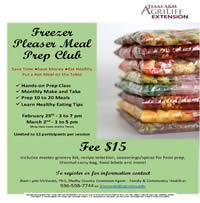 February 19, 2019 - Tired at the end of your workday, need to find a way to save on your grocery budget, want to put a delicious hot and healthy meal on the dinner table? If you answered “yes” to any of these questions, then the Freezer Pleaser Meal Prep Club workshop is for you! Join other like-minded people to learn and prep 10 to 20 freezer meals on monthly basis.
February 19, 2019 - Tired at the end of your workday, need to find a way to save on your grocery budget, want to put a delicious hot and healthy meal on the dinner table? If you answered “yes” to any of these questions, then the Freezer Pleaser Meal Prep Club workshop is for you! Join other like-minded people to learn and prep 10 to 20 freezer meals on monthly basis.
Texas A&M AgriLife Extension Shelby County will be hosting the first monthly meal prep classes on Monday, February 25th from 3 to 7pm and Saturday, March 2nd from 1 to 5pm at the Extension office, 266 Nacogdoches Street, Center, TX 75935. These classes are “come and go” sessions so that you can prep, freeze, and eat a healthy meal over the course of time. You may participate in one workshop or both. Additional workshop sessions will be held the last Monday and first Saturday of each month.
How does this work?
• A selection of recipes will be provided in advance to participants so that you may choose the meals you want to make and take.
• A master grocery list for food items to purchase will be available for email or pickup.
• All seasonings/spices will be provided each participant.
• Printed food meal labels will be provided for your use.
• Kitchen bowls, prepping items, measuring cups/spoons, food scales, and more will be available for your use.
Bring your food, have fun, prep your meals for the next month, then sit back and admire your stocked freezer and think about the time and money you have saved while putting that delicious hot meal on the dinner table in no time at all.
Registration and payment in advance is required to hold your space. The cost for this workshop is $15 per person per session. Sessions are limited to 12 participants. If you would like to register or need more information, please contact Jheri-Lynn McSwain, CEA-FCH at 936-598-7744 or via email at jlmcswain@ag.tamu.edu
October 19, 2018 - Calling all Shelby County youth and parents! Have you ever wanted to learn something new and different while having fun? Well we have it, from cooking, taking pictures, fashion, robotics, shooting sports, raising and showing livestock and much, much more for youth 3rd through 12th grades. Youth members may join now until October 31st for a $20 participation fee. Price changes November 1st to $25. Adults pay a $10 volunteer applicant fee. An active enrollment is required in order to register and participate in all 4-H activities and events.
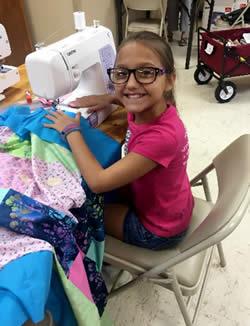 What is 4-H?
What is 4-H?
4-H is a national organization which helps young people develop life-long knowledge and skills to become engaged citizens. Through 4-H, youth are also taught how to meet the diversities and challenges of today’s society by bringing together youth and adults to design programs that will teach skills for living. 4-H is truly a model of the “learning by doing” teaching concept. It reaches people in their own communities with delivery methods suitable to their needs. 4-H also helps to provide opportunities for families and communities to develop stronger bonds
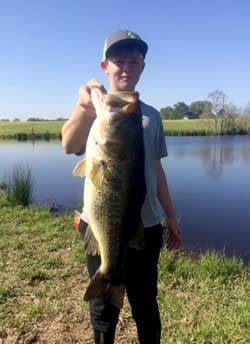 2018 projects offered include:
2018 projects offered include:
Shooting Sports, Photography, Foods and Nutrition, Clothing and Textiles, Robotics, Quilts of Valor, Outdoor Challenge, Taxidermy, Horse, Poultry, Beef, Swine, Rabbit, Goat, Sheep, Leadership
Monthly Club Meetings:
Shelby County clubs will meet at the new Extension office the 1st Monday of each month at 6:00 p.m. Monthly meetings will feature a theme, a hands-on program, provide a food prepping and tasting opportunity and a fun team building recreation component.
Scholarship Opportunities:
Shelby County 4-H will be providing up to a $1,000 scholarship for continued education past high school, whether it be college or trade school. The annual winner will be selected on an earned point system for project and club meeting participation, community service, leadership and more.
So, come by the office and see what Shelby County 4-H has to offer your child. If you have any questions regarding 4-H, please do not hesitate to contact the Shelby County Extension Office at 936-598-7744, Lane Dunn, Ag/NR Agent and Jheri-Lynn McSwain, FCH Agent. Be sure to check us out on Facebook at Shelby Extension.
July 2, 2018 - Last day to order broilers for the Shelby County 4 H and FFA Broiler show is here!
A pen of 30 chicks can be ordered and purchased for $30. Show rules and paperwork may be picked-up at the Extension office at 266 Nacogdoches Street (Old Elementary School Library Bldg.) All orders are due no later than July 2nd and are payable by check or money order only. Tentative date for pick-up of show chickens is the week of August 20, 2018. The 2018 Broiler Show and Sale will be held on October 6, 2018.
There will be a mandatory information meeting for anyone who wishes to participate in the Shelby County 4 H and FFA Broiler Show for 2018. This meeting will be held at the Shelby County 4H facilities located at 226 Nacogdoches Street on August 7, 2018 at 6:00 p.m. Each exhibitor must have a parent or legal guardian (or a representative designated in writing by a parent or guardian) in attendance at that meeting.
Exhibitor’s WILL NOT be able to participate in the show without having attended this meeting.
Please make arrangements to attend.
If you have questions about participating in the 4-H Poultry project or learning what is involved in showing and raising chickens as a 4-H member, give Lane Dunn, Shelby County Extension Agent for Agriculture and Natural Resources a call at 936-598-7744 or email at jldunn@ag.tamu.edu.
Anyone needing special assistance at any Extension Program should contact the Texas AgriLife Extension Office of Shelby County at (936) 598-7744 at least two weeks prior to the event or program. Educational programs of the Texas A&M AgriLife Extension Service are open to all people without regard to race, color, sex, religion, national origin, age, disability, genetic information or veteran status. The Texas A&M University System, U.S. Department of Agriculture, and the County Commissioners Courts of Texas Cooperating.
May 18, 2018 - The 2018 District 5 4-H Shoot was held at Pines Gun Club in Lufkin, TX on May 5th. District 5 consists of 22 counties in East Texas. Representing Shelby County 4-H Shooters were: Emily Bennett and Rex Payne. The results were as follows:
Intermediate Novice Division:
Emily Bennett-4th in Trap/Skeet, and 2nd in Tower
Junior Novice Division:
Rex Payne-5th in Trap/Skeet, and 2nd in Tower
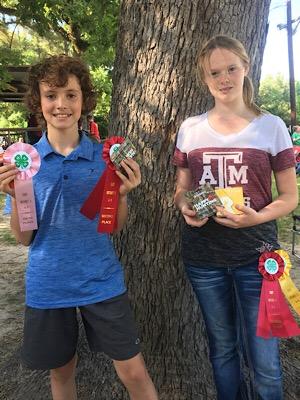
Please help us congratulate these participants on a job well done representing Shelby County 4-H.
If you have any questions or would like more information regarding 4-H, please give us a call at 936-598-7744.
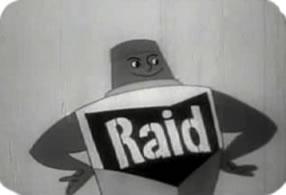
February 13, 2018 - Mr. Raid, from an early 1950s TV commercial, has influenced our thoughts about pest control.
For many of us, the ultimate solution for cockroaches and bed bugs and other household pests is the “bug bomb.” Remember the old Raid commercials, where bugs flee from Mr. Raid, only to be followed home by the ominous cloud of death? The implication is that the cloud from a bug bomb is like a heat seeking missile, able to follow pests into their deepest safe houses.
So how well do bug bombs really work? It turns out, not nearly as well as the animated ads suggest. Give a bed bug even a slip of cotton fabric to hide under, and even highly pesticide-susceptible bed bugs are unaffected by a total release fogger (bug bomb) blowing its top only a few feet away. This, according to a study conducted at Ohio State a few years ago.
Pest control professionals have long known that bug bombs in kitchens and other areas rarely eliminate cockroaches. Rather they seem to drive pests deeper into walls and utility areas. It turns out that aerosol insecticides do not penetrate cracks and crevices where pests spend most of their time.
Then there’s the growing concern about safety. A recent CDC report documented 3200 illnesses resulting from use of TRFs in just a few states between 2007 and 2015. Of these cases, 92% occurred in homes. Symptoms of exposure included cough, shortness of breath, chest irritation, vomiting, nausea, and cramping. 78% of cases were classified as low severity, and four out of the 3,222 cases were fatal. Some cases occurred when users did not vacate the treated areas while treating. Other times people entered too soon, or before the home was adequately aired. Moderate and severe illnesses occurred in men over 60, people with preexisting asthma, or who did not leave the treated area as instructed on the label.
Insects that escape into cracks and crevices are tougher than TV ads would have you believe. Insecticide fogs are not designed to penetrate under or inside furniture or walls.
This is no “smoking gun” report, implying that TRFs cannot be used safely indoors. Rather it seems to indicate that many people are not following fogger label directions, and thus reaping unhealthy consequences.
 And then there are those folks who guess as to how many bug bombs they need, rather than following the label. It seems to be a universal human belief that when it comes to insecticides, “if a little is good, more will be better.” But besides increasing the risk of pesticide overexposure, using too many TRFs can lead to explosions, especially when aerosol particles build up around an open flame, like a stove or water heater pilot. This fact helped elevate bug bombs into the follies section of Snopes.com (a myth busters website dedicated to exposing urban legends). In this case, Snopes investigated the idea that bug bombs might cause explosions and found that indeed explosions can result from using too many bug bombs at a time. One recent explosion, not only destroyed an apartment, but killed the owner’s cat.
And then there are those folks who guess as to how many bug bombs they need, rather than following the label. It seems to be a universal human belief that when it comes to insecticides, “if a little is good, more will be better.” But besides increasing the risk of pesticide overexposure, using too many TRFs can lead to explosions, especially when aerosol particles build up around an open flame, like a stove or water heater pilot. This fact helped elevate bug bombs into the follies section of Snopes.com (a myth busters website dedicated to exposing urban legends). In this case, Snopes investigated the idea that bug bombs might cause explosions and found that indeed explosions can result from using too many bug bombs at a time. One recent explosion, not only destroyed an apartment, but killed the owner’s cat.
The lesson from all this is that foggers are not very effective for insects that spend most of the time hiding, such as immature fleas, cockroaches, bed bugs and ants. They can help rid a room (temporarily) of flying insects, or insects otherwise in the open; but these problems are much less common. There are many other, better, ways of managing cockroaches and bed bugs that you can read about in the Citybugs website.
Personally, I don’t often recommend total release foggers. But if you choose to use one, take the time to calculate the size of the room (length X width X height) before your purchase. Then read the product label in the store to calculate how many TRFs you need. Do not buy or use more than recommended. It is a waste of money and potentially dangerous to you and your pets.
Lane Dunn is the County Extension Agent for agriculture and natural resources for Shelby County. His email address is jldunn@ag.tamu.edu
Educational programs of the Texas A&M AgriLife Extension Service are open to all people without regard to race, color, sex, disability, religion, age, national origin, genetic information or veteran status. The Texas A&M University System, U.S. Department of Agriculture, and the County Commissioners Courts of Texas Cooperating.
December 22, 2017 - I was falsely accused last week. A distraught homeowner called about the hordes of insects that had come into her house. They were Lady Beetles looking for a place to overwinter.
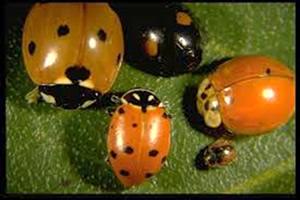 When I told her they are a common nuisance and could simply be vacuumed up or swept out, she told me that I didn’t understand, she had a “serious infestation!” So much was her distress that my ability to comprehend large numbers of insects was called into question!
When I told her they are a common nuisance and could simply be vacuumed up or swept out, she told me that I didn’t understand, she had a “serious infestation!” So much was her distress that my ability to comprehend large numbers of insects was called into question!
It is true that homeowners may be seeing numerous lady beetles invading their homes this time of year. Lady beetles are insects that are considered beneficial. But they are not invading your home to cause problems, only to stay warm. The lady beetle does not chew or bore holes in walls nor do they eat carpet or any food in the pantry.
While they cause no harm, their overwintering habits inside people’s homes causes them to be a nuisance.
Lady beetles have been considered one of our most beloved insect. They are in stories, a good luck charm for some, and I’ve even seen kids dress up as one for Halloween. You’d never see a kid dress up as a fire ant or termite!
Locally we call them Lady Bugs. If you grew up and don’t remember seeing as many, you are absolutely correct.
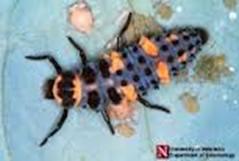 There is a native Lady beetle that are harder to locate and a multitude of non-native insects that are native to Asia but in the past few decades have spread to many areas of the United States.
There is a native Lady beetle that are harder to locate and a multitude of non-native insects that are native to Asia but in the past few decades have spread to many areas of the United States.
This beneficial (yet sometimes controversial) Asian relative was released in the United States as early as 1916. More were released in the late 1970’s and early 1980’s. It has taken years for the populations to spread, but now large populations are found in many areas of the south, northeast, Midwest, and as far north as Oregon and Washington.
Adult beetles can have a variety of colors and spots. The larvae are soft-bodied, gray and orange, and covered with rows of raised black spots.
The lady beetle is an effective and natural control for harmful plant pests such as aphids, scale, and other soft-bodied arthropods. One adult lady beetle may eat over 5,000 aphids during its lifetime.
A few folks ask if they bite. Well, sort of.
Lady beetles have mandibles, a jaw-like part of their mouth that they use to capture and eat their prey. And while they are not out to bite (like a fire-ant) or sting (like a hornet), they can certainly give someone a good pinch on the skin with those mandibles!
The lady beetle also has a defense mechanism. If agitated or disturbed, the beetle’s reaction is to “reflex” bleed in which a yellow fluid with an unpleasant odor is released from the leg joints. This reaction helps prevent predators, such as birds, from eating the lady beetle.
This fluid can sometimes stain walls and fabrics.
The lady beetle is attracted to lighter colors such as whites, grays, and yellows. They enter homes through cracks and crevices. During warm winter days and early spring, the lady beetle may become more active searching for an exit.
No “control” of these beneficial insects is warranted as is for termites or perhaps fruit flies. Prevent them from entering the home by caulking exterior cracks and crevices. Sweeping and vacuuming are effective means of removing these insects from the living area.
Article by Lane Dunn, County Extension Agent for agriculture and natural resources for Shelby County. His email address is jldunn@ag.tamu.edu
Educational programs of the Texas A&M AgriLife Extension Service are open to all people without regard to race, color, sex, disability, religion, age, national origin, genetic information or veteran status. The Texas A&M University System, U.S. Department of Agriculture, and the County Commissioners Courts of Texas Cooperating.
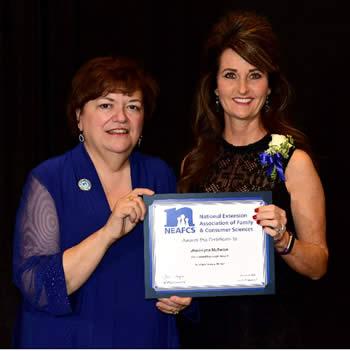
November 6, 2017 - Jheri-Lynn McSwain, Shelby County Extension Agent was honored recently at the National Extension Association for Family and Consumer Sciences (NEAFCS) 2017 annual session for her programming efforts in Shelby County, Texas. She received the 1st place National and 1st place Region NEAFCS Greenwood Frysinger Fellowship Award, 2nd place National and 3rd place Southern Region Mary W. Wells Memorial Diversity Award, 2nd place National and 1st place Southern Region Environmental Education Team Award, and 3rd place Southern Region Communications Educational Technology Award at the conference held on October 19, 2017 in Omaha, Nebraska.
The Greenwood Frysinger Fellowship is granted to an Extension Educator in Family and Consumer Sciences by NEAFCS to give members an opportunity to participate in a professional development opportunity of their own choosing. The award was presented based upon McSwain’s work with the Shelby County Community Garden project and school gardening programs at Center Elementary, S.W. Carter Elementary, and Excelsior School.
She received the Mary W. Wells Memorial Diversity Award and was recognized for her collaboration with Piney Woods Outreach Center to offer Step Up and Scale Down, a 12-week nutrition, fitness and weight management program for 63 participants in which 414 pounds of weight was lost. The Mary W. Wells Memorial Diversity Award is presented in support of the Cooperative Extension System emphasis on diversity and pluralism—a national program to respond to the changing work force, population and Extension audience.
The Environmental Education Award recognizes NEAFCS members for outstanding educational programs conducted for families and/or communities on various environmental issues concerning water quality, air quality, recycling and natural resource conservation. McSwain served on a team of Region 4 and 5 Extension agents to develop and provide Earth-Kind Living Expos for participants to learn about ways to make their homes and land more environmentally sound.
The Communications Educational Technology Award was given in recognition for her program development of “Food Waste and Kitchen Pest Management” for use by other agents across the state. These NEAFCS awards were presented McSwain for her commitment to meeting the needs of individuals, families and communities.
